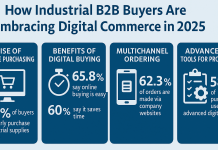We’ll go over all you need to know about B2B lead creation in this tutorial. You’ll discover all you need to know about generating B2B leads and maximizing your outcomes, from the methods you and your marketing teams could utilize to how it all works. Whether you’re a seasoned pro or this is all new to you, you’ll discover clear explanations and best practice guidance that will put you on the path to a successful lead-generating formula for your company.
What is B2B lead generation?
B2B lead generation is the process of discovering and picking the attention of potential customers in marketing. Or, to put it another way, it’s the first step every company must do before making a sale. Identifying potential consumers entails locating businesses that could be interested in the product or service your company provides (your target audience). Capturing information from these connections and pushing it into your sales funnel is what initiating interest is all about. With a sale, a lead may be transformed into a client.
B2B organizations typically have varying criteria for what constitutes sales qualified leads (SQL), as it varies depending on the industry or specialty in which the company operates.
Lead generation is typically associated with advertising, however it isn’t confined to paid channels or approaches. Lead generation may be classified as any online or offline method that produces interest in your website or business. Event marketing, social media, email marketing, pay-per-click advertising, cold calling, and content marketing are the most popular methods employed.
A well-designed website that is properly optimized and focused on creating interest in your services is one of the most crucial parts of modern lead generation marketing.
How does lead generation work?
It might be tough and time-consuming to generate leads. The concept, on the other hand, is rather straightforward.
You must design a website or landing page that promotes a product or service and ensure that it is seen by the appropriate audience. Then, using a compelling call to action, encourage those visitors to fill out a form or otherwise provide their contact information so that you may contact them later.
It’s not always easy to make this happen. The procedure may be split down into many parts, each of which will need meticulous preparation, adequate funding, and competent execution (with a lot of trial and error involved to get it right).









